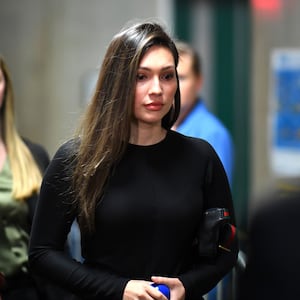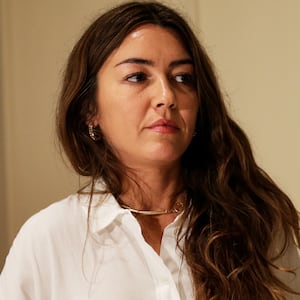Harvey Weinstein’s defense team urged jurors Thursday to disregard their “gut feelings” about the disgraced Hollywood producer—who’s been accused by over 80 alleged victims of sexual misconduct—arguing that prosecutors in his landmark rape trial in Manhattan stripped “adult women” of their own responsibility.
“In their universe, women are not responsible for what parties they attend, the men they flirt with... for the jobs they ask for help to obtain, for the hotel rooms they go to, or the airplane tickets they accept,” defense attorney Donna Rotunno declared during her closing arguments in Manhattan Supreme Court. “In this script, the powerful man is the villain, and he is so unattractive and large that no woman would want to sleep with him voluntarily.”
Weinstein, 67, has pleaded not guilty to five charges, including predatory sexual assault and first-degree rape, for the alleged sexual assault of Miriam Haleyi inside his SoHo apartment in 2006 and the 2013 rape of Jessica Mann inside a New York hotel room.
ADVERTISEMENT
Dressed in a black suit and striped tie, Weinstein refused to answer questions before shuffling into the packed courtroom with his walker, barking at reporters to “talk to these lawyers” while pointing at his three-person legal team.
“You don’t have to like Mr. Weinstein, this is not a popularity contest,” Rotunno told the jury, which is composed of seven men and five women. “In this country, it is the unpopular person that needs a jury the most.”
Prosecutors have argued the Shakespeare in Love producer used his power and prestige in the entertainment industry to prey on women for over three decades, promising to kickstart their careers in exchange for sex acts.
Over the last month, half a dozen women have given graphic testimony against Weinstein, with most of them claiming the Oscar-winner lured them into isolated places by promising to discuss their careers. Once alone, he sexually assaulted them, sometimes justifying the act by complimenting them or insisting “this is how all actresses make it,” multiple women testified.
Afterward, the women said they kept silent or didn’t tell the authorities because they were so afraid he’d ruin their chances of making it in Hollywood.
Throughout her five-hour closing argument, Rotunno claimed Weinstein only had consensual sexual relationships with the women who testified against him, insisting that the toppled titan was a “busy man” who didn’t have time to “develop some grand plan to meet women.”
The defense attorney asked jurors to use their “New York common sense” to “do the right thing” as the “last line of defense” from “overzealous media and overzealous prosecutors.”
“As [Weinstein] sits here, he is an innocent man. He was innocent when he was charged with an indictment. He was innocent when each witness took the stand and he is innocent as he sits here right now,” the defense lawyer argued before pointing to a PowerPoint slide with the definition of “presumption of innocence” and “burden of proof.”
“You may have had a gut feeling that Harvey Weinstein was guilty. Throw that gut feeling right out the window,” she added.
As Rotunno walked the jurors through a synopsis of the trial with the aid of a PowerPoint presentation, Weinstein stared at a computer screen in front of him and occasionally looked over at the jury.
The defense attorney argued that Haleyi—a 42-year-old former Project Runway production assistant who alleged that Weinstein forcibly performed oral sex on her at his SoHo home in 2006—manipulated the situation to further her career.
“The truth leaves a paper trail,” Rotunno said, referring to friendly emails the former production assistant sent to Weinstein years after the alleged assaults. “Other than her accounts, what she said happened on that one day in July doesn’t make sense in conjunction with every other action she took. Ask yourself: Did she say what happened on July 10th actually happened?”
Weinstein’s attorney also sought to discredit Mann, 34, who said during her emotional three-day testimony that the producer assaulted her multiple times during their twisted relationship—including raping her in a DoubleTree Hotel room in March 2013 and attacking her again months later at a Beverly Hills hotel.
“Even if you believe every word she says about what happened in that the hotel room, it does not rise to the level of rape,” Rotunno insisted, referring to Mann’s testimony that in one incident she “gave up” after initially resisting Weinstein’s commands to undress. “This is not rape. This is not sexual assault. This is someone who agrees to do what has been discussed.”
After the alleged rape, Mann said she immediately ran into the bathroom while Weinstein got dressed—and realized that the producer had injected himself with medication to get an erection.
“If this is someone who claims to be as fearful as she claimed to be about the needle she saw… wouldn’t she go get an STD test?” Rotunno argues, noting that none of the women who testified against Weinstein said they got tested after their alleged assaults.
The former aspiring actress admitted that despite the abuse, she maintained a relationship with Weinstein to “protect” herself and her budding acting career, during which they had multiple consensual sexual encounters.
Weinstein’s defense attorneys insisted Mann was not a victim but a manipulative opportunist who maintained contact with the Pulp Fiction producer through friendly emails years after the alleged assaults. Rotunno added that if the defense went through every email between Weinstein and Mann, the accuser “would still be on the stand.”
“In the end, it comes down to those two,” Rotunno said. “If you don’t believe Miriam Haleyi and Jessica Mann, you don’t have to evaluate anyone else.”
In addition to Mann and Haleyi, jurors have also heard from four corroborating witnesses whose allegations fall outside the statute of limitations: Sopranos actress Annabella Sciorra, who said Weinstein violently raped her in her apartment in 1993 or 1994; Dawn Dunning, who said Weinstein sexually assaulted her in 2004; Tarale Wulff, who was allegedly assaulted by the producer a year later; and Lauren Young, who was allegedly assaulted in Weinstein’s Beverly Hills hotel room days before the 2013 Oscars.
Calling Wulff “the witness who tells you she can’t remember anything,” and Sciorra “the darling of the movement of the moment,” Rotunno dissected each woman’s testimony on Thursday, arguing their allegations are riddled with inconsistencies that prove the prosecution failed to meet the burden of proof.
“She is more relevant than she was ever before,” Rotunno said about Sciorra. “She changed her memories and now she was raped. Once again, she is a star.”
Rotunno argued that all six women reached out to Weinstein after their alleged assaults and “asked for things and he does anything he can do to make it happen.”
“This is not the monster they paint him out to be,” she claimed, later insisting the prosecution presented an “alternate universe.”
Leaving the courtroom Thursday, The King’s Speech producer had only one thing to say to reporters demanding his thoughts on his legal strategy: “I loved it. I called it the Queen’s speech.”









